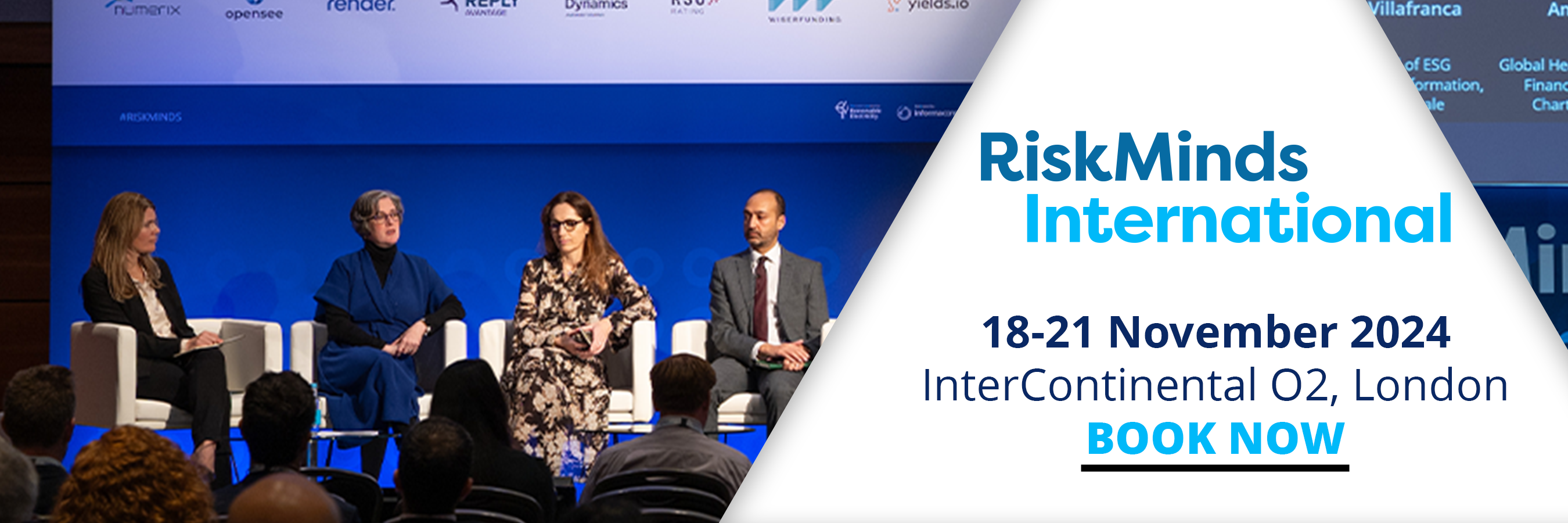Greenwashing is a reputational risk that needs standardisation

The need to restrict how terms like ‘green’ and ‘sustainable’ are used has been evident for a long time. It was debated on the summit day of the RiskMinds International conference on 13 November at the InterContinental O2 Hotel in London by a panel consisting of the heads of sustainable finance:
- Geneviève Piché, Head of Sustainable Finance and Advisory, Wells Fargo
- Valerie Villafranca, Group Head of ESG Operational Transformation, Société Générale
- Amit Puri, Global Head, Sustainable Finance, Standard Chartered Bank
- Nick Talbot, Head of Climate Risk, NatWest Group
- Moderated by Eriola Beetz, Managing Director and Partner, Boston Consulting Group (BCG)
A standardised framework is needed to provide a pathway for how the transition towards a net zero carbon emission economy can be achieved, without charlatans damaging the process, attendees at the Climate Risk & Sustainable Finance Summit stream were told.
Investors need to know what companies to invest in and what specific terms like nature or climate risk actually mean – in regard to how companies are operating, and what the risks of lending to or investing in them might entail.
Otherwise, in 20-30 years times a bank could get sued for lending to a coal miner without proper due diligence being performed. At the very least the practitioner themselves could get sued like ‘Big Tobacco’ was last century.
There is a financial and a reputational risk attached to the greenwashing debate, especially as consumers and investors grow more aware of the ESG agenda, which maps to the Environmental, Social and Governance principles set out under the UN’S 17 Sustainable Development Goals (SDGs).
In the UK there is already the Climate Financial Risk Forum (CFRF), explained a panellist. This brings together senior financial sector representatives to share their experiences in managing climate-related risks and opportunities.
Established in 2019 under the auspices of the Financial Conduct Authority (FCA), the CFRF is intended to drive best practice and help financial institutions (FIs) identify the risks and opportunities of the 21st century green economy.
The FCA’s anti-greenwashing final rulebook is due very soon as well. This will restrict how ‘green’ terms can be used in future and hopefully bring order to the global transition towards net zero that is underway.
What is green?
However, you need to clearly and globally define what is ‘green’ and ‘sustainable’, according to a panellist, only then can you internally work out the exposes and opportunities in your balance sheet against a clear, common criteria.
The green field hasn’t stabilised yet. But FIs need to capture and measure transactions that are driving the transition towards net zero. All banks have their own FI frameworks at present. But the European Central Bank (ECB) and others can help here in providing standardisation for European FIs as the FCA have in the UK. Moves are underway.
Global perspective: Europe, UK, US & Asia
The US and Emerging Markets (EM) viewpoints from Africa and Asia were provided in the panel session dedicated to mitigating greenwashing.
The US doesn’t have such a strong regulatory environment. Instead FIs there tend to focus on Return on Investment (RoI) metrics and consumer and corporate demands for better, more accurate ‘green’ information, so that they are ready for the certified green future. Specific examples were given of the risks that face business of all types in the 21st century if they don’t gasp this issue and transition towards a more sustainable business model. For instance, there are:
Nature and bio-diverse risks
In the US, this will impact cotton growers that supply the garment industry. These farmers, who some banks likely lend to, might suffer crop failure due to climate change, or their business may come under attack from those that want better social well-being and governance metrics in the notoriously price sensitive clothing industry. Farmers need to be aware of these ‘green’ issues and washing them under the table serves no good long-term end. It is the role of a bank to be a trusted advisor and help in this regard.
Business elimination climate risks
Sriracha hot sauce hasn’t been available in the US for two years because the peppers it is made from in Northern Mexico aren’t resilient enough to the constantly changing climate. That is a concrete example shared at the Climate Risk & Sustainable Finance Summit of what businesses might be sustainable – and what models might not be – in the future.
The ESG, sustainable, green agenda is “plagued by ambiguity”, said one of the panellists. That needs to change if a more socially aware, less environmentally damaging way to do business is truly to take hold.
Nature risk, in terms of palm oil usage causing deforestation and the elimination of species, is another emerging and poorly standardised risk that FIs will increasingly have to grapple with. However, data availability is an issue here.
How do you provide sustainable finance when you don’t have the data? Well, the onus falls on banks to do their own work, while they wait for regulators, governments and others to catch up. “For example,” said a panellist, “we do have climate risk data and we can make assumptions about nature risks from that.”
In the end, a standardised global approach would be more efficient, transparent and beneficial than FIs all doing their own thing individually or regionally, as tends to be the case at the moment.
A standardised global approach would also prevent greenwashing initiatives that are marketing-led and without substance from proliferating. This type of alleged ‘green’ initiative is a reputational risk, especially if an FI incorrectly OK’d a transaction without fully realising its adverse ESG impacts. Consumers might then boycott the bank. They might even be sued later on down the line.
Best to get rid of the greenwashing now and get real about what is meant by sustainable investments, projects and metrics. Defining them strictly and clearly will lead to better outcomes.
